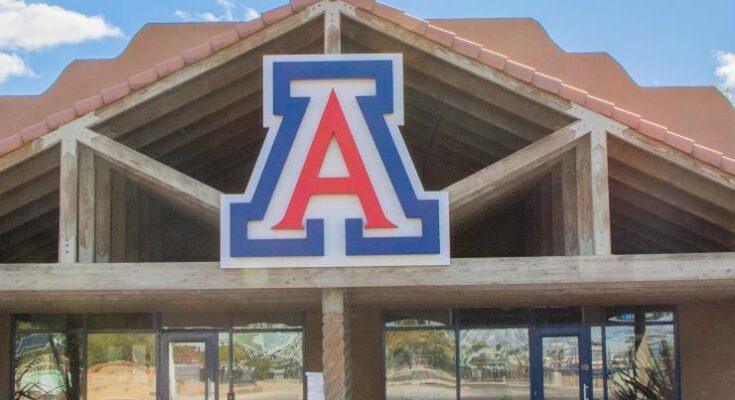Introduction to the University of Arizona
Founded in 1885, the University of Arizona (UArizona) stands as a premier public research institution located in Tucson, Arizona. Renowned for its academic excellence, the university offers over 300 undergraduate and graduate degree programs across diverse disciplines. UArizona is recognized as a land-grant university, committed to addressing societal challenges through research, education, and service.
The university hosts a vibrant campus community with students from over 100 countries, fostering global connections and cultural exchange. With its designation as a Research 1 (R1) institution, UArizona drives innovation through interdisciplinary collaborations and groundbreaking discoveries. Its impact stretches far beyond borders, shaping industries and communities worldwide.
Historical Overview of the University
The University of Arizona, established in 1885, emerged as Arizona’s first university under the Morrill Act of 1862, aimed at expanding educational opportunities across America. Situated in Tucson, its initial offerings were limited to agriculture and mechanical arts to address regional needs. With a humble foundation, its growth steadily encompassed additional disciplines, including engineering, medicine, and the sciences. By the early 20th century, the institution cultivated a reputation for research excellence. Transitioning into the postwar period, the university expanded both its academic programs and campus facilities, reflecting the state’s economic and population growth. Today, it stands as a leading research university with global influence.
Campus Life in Tucson
The University of Arizona provides students with a dynamic and vibrant campus experience nestled in the heart of Tucson. The campus offers state-of-the-art facilities, including cutting-edge research laboratories, sustainable buildings, and expansive outdoor spaces tailored for academic and recreational activities. Tucson’s environment fosters community engagement through cultural festivals, art galleries, and strong connections to the local Arizona heritage. The campus encourages collaboration with its diverse student body, representing numerous countries and cultures globally. Nearby hiking trails and picturesque desert landscapes add to its appeal, blending nature with academics. Students benefit from extensive support services, clubs, and career-building opportunities.
Academic Programs and Degrees Offered
The University of Arizona in Tucson offers a wide variety of academic programs designed to meet the evolving needs of students and industries worldwide.
- Undergraduate Programs: The institution provides over 150 bachelor’s degree programs across disciplines such as engineering, arts, business, and health sciences.
- Graduate Programs: Over 100 master’s and doctoral degree options are available, spanning areas like law, medicine, and environmental studies.
- Professional and Online Education: Certificate programs and fully online degrees cater to working professionals and distance learners.
- Interdisciplinary Focus: Many programs integrate fields like data science, sustainability, and global studies, fostering innovative problem-solving skills.
- Specialized Research Opportunities: Students can participate in cutting-edge research through well-established partnerships and global collaborations.
Research Opportunities and Facilities
The University of Arizona in Tucson offers state-of-the-art research facilities and extensive opportunities across diverse disciplines. Researchers have access to cutting-edge laboratories, including those dedicated to astronomy, biosciences, and environmental studies. Graduate and undergraduate students collaborate on groundbreaking projects, fostering innovation.
Key facilities include:
- Arizona Health Sciences Center for medical advancements.
- Biosphere 2 supporting environmental and sustainability studies.
- Richard F. Caris Mirror Laboratory enabling astronomical explorations.
The university also partners with federal agencies such as NASA, providing unparalleled experiential learning. Advanced technological support enhances research productivity, fostering global contributions across scientific sectors. Opportunities abound for funded grants and interdisciplinary collaboration, marking Arizona as a hub for transformative discovery.
Student Support Services and Resources
The University of Arizona in Tucson offers extensive student support services designed to foster academic success and personal growth. Dedicated programs address diverse needs, creating a supportive environment for learners from varying backgrounds.
- Academic Assistance: Tutoring centers, writing workshops, and academic advisors are accessible to ensure students excel in their studies.
- Career Development: Career counseling, job fairs, and networking opportunities prepare students for future endeavors.
- Health and Wellness: Comprehensive resources include counseling, fitness programs, and healthcare services.
- Cultural Engagement: Multicultural centers and community events promote inclusion, celebrating diversity on campus.
These services ensure student success while maintaining a focus on their overall well-being.
Notable Faculty and Alumni
- Richard Feynm: Renowned physicist and Nobel laureate who contributed significantly to quantum mechanics and electrodynamics.
- Arlie Hochschilde prof of Sociology.
- Boys And Girls
Extracurricular Activities and Student Organizations
The University of Arizona offers diverse opportunities for students to engage in extracurricular activities and join student organizations. With over 600 clubs and organizations available, students can explore interests ranging from academics and leadership to sports and the performing arts.
Student government bodies, such as the Associated Students of the University of Arizona (ASUA), provide platforms for developing leadership skills. Campus life is further enriched by cultural clubs promoting inclusivity through festivals, events, and discussions.
Athletic opportunities include club sports, intramural leagues, and fitness classes encouraging physical activity. By participating, students cultivate teamwork, professional growth, and lifelong friendships.
Community Engagement and Outreach
The University of Arizona fosters strong ties with communities locally, nationally, and globally through a variety of engagement initiatives. Its outreach efforts prioritize education, health, environmental sustainability, and cultural enrichment. Programs such as Project SOAR inspire local Tucson youth, empowering them with mentorship and academic resources. Partnerships with tribal nations promote cultural preservation and access to higher education. Faculty-led outreach programs address global challenges, including water scarcity and climate change. The University’s public lectures, art exhibits, and performances bridge academia with broader audiences, fostering intellectual and cultural exchange. These efforts underscore its commitment to social progress and inclusive collaboration.
Global Partnerships and Collaborations
The University of Arizona fosters impactful global partnerships, engaging with institutions and organizations across continents to advance research, education, and innovation. Collaborating with over 100 international universities and research centers, it facilitates cross-border knowledge exchange. Critical initiatives include sustainable development projects, cutting-edge scientific research, and cultural enrichment programs. The university’s study-abroad opportunities enable students to immerse themselves in diverse cultures and expand their global perspectives. Through robust collaborations in fields such as biotechnology, engineering, and environmental sciences, it reinforces a commitment to addressing global challenges. These efforts underscore its pivotal role in shaping global education and fostering international cooperation.
Sustainability Initiatives on Campus
The University of Arizona in Tucson demonstrates a robust commitment to sustainability through diverse initiatives. It has integrated environmentally responsible practices into campus operations, including water conservation systems and renewable energy installations. The institution actively reduces waste through recycling programs and promotes sustainable transportation options such as bike-sharing and electric vehicle charging stations.
Academic offerings include sustainability-focused courses and research, ensuring students remain informed about global environmental challenges. Community engagement programs further amplify this impact by empowering individuals to adopt sustainable habits. By fostering partnerships with organizations, the university aligns campus goals with broader sustainability objectives to challenge environmental issues effectively.
Student Success Stories
Graduates from the University of Arizona in Tucson consistently distinguish themselves locally and globally, demonstrating excellence across numerous industries. Alumni leverage groundbreaking research, interdisciplinary studies, and professional mentorship to influence fields such as engineering, healthcare, technology, and arts.
- Notable Achievements: Graduates have developed patented innovations, led global organizations, and contributed to pioneering medical breakthroughs.
- Community Impact: Many students return to their communities as educators, policymakers, and advocates for social change.
- Global Contributions: Alumni hold influential positions worldwide, driving sustainable development and advancing scientific discovery.
These stories exemplify the university’s commitment to fostering transformative education and empowering lifelong impacts.
Scholarships and Financial Aid
The University of Arizona in Tucson offers an extensive array of scholarships and financial aid opportunities to support students from diverse backgrounds. With a commitment to accessibility, the institution provides merit-based scholarships for academic excellence, such as the Arizona Excellence Award. Need-based aid is also available to assist students facing financial challenges, including grants and work-study programs.
International students benefit from tailored scholarships that foster global engagement. Additionally, the university collaborates with private organizations and donors to expand funding options. Through personalized financial aid counseling and resources, the institution ensures students receive guidance to achieve their educational goals.
Future Prospects and Developments
The University of Arizona in Tucson is positioned for extensive growth and enhanced global influence through strategic initiatives. Plans for investment in cutting-edge research centers and sustainable infrastructure aim to further solidify its role as an academic leader. Emerging collaborations with international institutions are anticipated to foster innovation in diverse fields, including technology and environmental sciences.
The university continues to prioritize accessibility by expanding online education platforms, ensuring a wider reach. Advancements in community engagement programs are expected to deepen ties with local and global communities, creating lasting societal benefits. Such developments underscore its commitment to adaptability and continuous innovation.
Conclusion: The University of Arizona’s Commitment to Excellence
The University of Arizona in Tucson advances its mission through a steadfast dedication to academic, research, and community-centric excellence. It fosters innovation by investing in cutting-edge interdisciplinary research, ensuring global contributions in fields like environmental sustainability, public health, and space science. Faculty and students benefit from initiatives that prioritize inclusivity and accessibility, reflecting its commitment to equitable education. Collaborative public-private partnerships amplify its impact, supporting economic growth and technological progress. Through global outreach and a focus on addressing societal challenges, the university positions itself as a leader in higher education and a model for transformative learning experiences.

